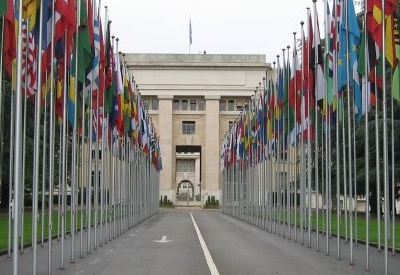What is a government's responsibility?
from July 9 2017
 |
| UN Shield |
The apocalyptic 21st c has carved out a
division on how best to determine the
rights and responsibilities of government
to their citizens, though, and maybe more
crucial, has been the case of collective
security. Economic matters will always
retain their zeal among government in
order to campaign for political office or reelection.
The founding of the United
Nations, the rights and responsibilities of
those in affected regions with instability
due to counter forces to the ruling elite
(see Syria) or simply those factions that are
at a crossroads of the many who fall under
policy that favour them (see Britain), place
a burden on UN members . The United
States has shouldered the burden of
collective security starting with The Treaty
of Paris in 1898 that shifted independence
to Cuba away from Spain and along with
that Puerto Rico, The Philippines, and
Guam into the American orbit and with
that, a stronger sense of colonialism.1
Rightfully, the first order of business for
government is the protection of their
citizens, those who reside within their
borders legally or have business interests
that require their presence for extended
periods of time (notwithstanding Multinationals.)
They must be a guarantor of
those rights or we have the prospect of
opportunities for terrorism such as the
incident in 1970 that led to the FLQ (Front
de liberation du Quebec- a French
Canadian separatist group) kidnapping
British Trade Commissioner James Cross
in Quebec, Canada. So, we have installed
various mechanisms to protect
government dignitaries and to a lesser
extent, the average legal citizen.
However, the founding of the United
Nations on October 24, 1945 promised a
new world order based on “collective
security” guaranteed by its members to
provide assurances of safety. Great idea
and wonderful concept, though, the post
WWII global structure weighed heavily on
the United States with much less of a role
for stalwarts such as the United Kingdom,
France and Italy. Germany and Japan had
much work in front of them to win back
the good graces of the international
community and still have work to do to
become truly sovereign nation- states
apart from American influence.
Former Harvard Professor, Samuel Huntington
famously spoke of a culture change
regarding conflict among humans in “The
Clash of Civilisations” in 1996. Huntington
could foresee the rise of Islamic
fundamentalism born out of the Israeli-
Palestine discord that has been festering
since the founding of the state of Israel in a
Post WW2 world. Staunch allies of Israel
among Western powers has given rise to
jihad and thrust various groups into the
spotlight,most famously or infamously, Al
Qaeda and Osama bin Laden.
This notion of collective security then begs
the question: what is a government’s
responsibility and to whom.
Libertarian’s refer to positive and negative
liberty. Negative liberty being
characterised as the notion that I am free
as long as I can act unimpeded by other
persons while I am pursuing my objectives.
If I am interfered with, then I am unfree. In
the positive sense of liberty, my decisions
are mine alone and not affected by
external sources. This sounds good but a
bit fishy. In government, we are affected
every day by external forces who impose
sanctions on us in the form of taxation.
In 2018 we are at the dawn of American tariffs on those
nation states that the Trump Administration deems scurrilous
in their pursuit of trade in a globalised universe.
In our daily lives,we encounter laws that may
affect us in a puerile manner, such as
minor infractions like jaywalking, riding a
bicycle without a helmet or other regional
laws that are devised to protect us from
ourselves and other citizens. The notion of
immigration can create some unease
because jobs are being shifted in this era
of globalisation and soft(er) borders. Seats
in classrooms are being allocated to
international students that create
competition among citizens for
opportunities in the work-place and
colleges that never existed to this extent
for past generations, which drive up the
cost of tuition. Yes, the benefit is a diverse
group of students who bring a well rounded
palette of ideas and experiences
to the class-room and this is invaluable.
Ditto for the work-place.
Back to the notion of collective – security,
the rise of jihad has spread to Europe and
has left many Parisians and European’s
lacking “Positive Liberty” which, in turn has
forced governments to ramp up efforts to
screen individuals or groups that may have
designs on terrorist activity. Pivoting back,
we might say that America and its allies
flubbed the security file in Libya, Iraq and
other nation-states that gave a window of
opportunity for terrorist’s to enter.
Currently, U.S. President Donald Trump is
correct in claiming that some nation-states
do not pay their fair share for collective
security. Yes, the system is a bit convoluted
with NATO a surrogate organisation
competing for funding in order to do what
the UN was designed to do in the first
place. NATO was designed as an anti-dote
to Eastern Europe and The Warsaw Pact,
which itself was designed as a collective
security blanket for the (FSU) Former
Soviet Union. Along the way, the Allies
found the lust for power too appealing
once the Berlin Wall fell and with it the
collapse of the Warsaw Pact. With that, the
West has embroiled Russia over NATO’s
incursion into Eastern Europe, while the
U.S. has China in its cross hairs over their
inability to curtail North Korea and their
pursuit of nuclear proliferation. The recent
death of American student, Otto
Warmbier begs for a military response to
North Korea’s abuse of the 22 year old
held in detention. The New World Order is
a, pardon the pun, a land-mine of Foreign
Policy rationale; hence, a military
operation on the Korean Peninsula might
engulf that region in uncertainty and a
refugee crisis for China and South Korea
will ensue. America, then, is caught
between a rock and a hard place in
protecting its mainland from a potential
missile strike from North Korea and
placating to Conservative’s who admonish
what Senator John McCain referred to as
the murder of Otto Warmbier.
(The Singapore Summit of June 12, 2018 shows
promise for bi-lateral relations between North Korea and America.)
Recent reports, however, suggest North Korea is beginning work at the Yongbyon
nuclear facility since the summit.)
Recent reports, however, suggest North Korea is beginning work at the Yongbyon
nuclear facility since the summit.)
Can America continue to operate in this version
of a collective-security vacuum, without
thrusting innocent parties into a global
conflict. Is it too late to turn back the clock
to a time when nation-states policed
themselves, first & foremost. Military
budgets be damned, suggest that with the
rise of defense spending, the notion of
peace-keeping will continue to vary with
the Heads of State as well, placating to
those nation-states that stimulate our
economies with lower priced goods and
multi-lateral, historical relationships. But,
an attack is an attack on positive and
negative freedoms and those that support
all forms of democracy. Therein lay a
government’s responsibility. Or not.
Works Cited
1. “1898: The Birth of a Superpower.”
Office of the Historian.
<https://history.state.gov/departmenthi
story/short-history/superpower.>




